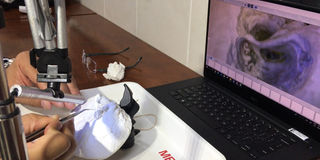Experts correct hearing defects in 5 children

An Otology surgeon demonstrates how a cochlear implant surgery is done at International Hospital Kampala yesterday. PHOTO/ IRENE ABALO
What you need to know:
Med-El in partnership with IHK have carried out about 20 successful surgeries on children during medical camps since 2017.
A team of regional and local ear, nose and throat (ENT) surgeons have successfully conducted a fourth cochlear implant camp to provide a small electronic hearing device to five children. The children were born deaf.
Cochlear implants are an option when hearing aids do not provide the clarity of sound needed to understand speech and spoken language.
The annual surgery camp, which involves training of local surgeons and conducted from International Hospital Kampala (IHK), is mainly for children below four years.
Whereas being born deaf can be hereditary, infections such as rubella, cytomegalovirus (CMV), toxoplasmosis and herpes can also cause a child to be born deaf.
There are also a range of medicines, known as ototoxic drugs, which can damage a baby’s hearing system before birth.
Of the five children operated from October 25 to 28, three had bilateral and two unilateral cochlear implants to correct their hearing defects.
The first cochlear implant surgery at IHK was done on five patients in 2017.
Ms Josephine Likichom, an audiologist at Kampala Audiology and Speech Centre, says the surgeries cost between $13,000 (Shs48.5m) to $16,000 (Shs59.7m) but the prices could double if done abroad.
“There are many people who still think they have to go out of Uganda to do cochlear implants. But it is the same thing we are doing here and cheaper. Insurers also need to consider offering such surgeries as part of their products,” Ms Likichom says.
Prior to carrying out cochlear implant surgeries in Uganda, a few patients who could afford had to meet the prohibitive costs of travel, accommodation and meals abroad; in India, Europe, United States of America (USA), Canada and other countries where the procedure is available.
“Normally if children are chosen correctly, then they can respond normally and go to streamline schools and have normal lives. With technological advancement, the processor, which is the external part, has gone through a lot of changes from being bulky and big to being behind the ear and just a small part which we operate on the children without wires,” Mr Mohamed El Disouky, the Africa development and regional manager for Med-El Medical Electronics, Austria, a global company in hearing loss solutions.
Since 2017, Med-El in partnership with IHK have carried out about 20 successful surgeries on children during medical camps.
Whereas these services are available in first world countries to enable the deaf develop appropriate speech and consequently language skills, most medical practitioners in Uganda were unable to perform the much needed surgeries for such deaf children.
However, the cochlear implant surgeries medical camp also trains third year Surgery master student and some surgeons to adapt to technological advancements.
Dr Loius Okema, the head of surgery at Gulu University, who is also an ENT surgeon, said the lack of data and skills about the deaf in Uganda is an impediment to the right to hearing for the deaf.
Distress to children
Otology surgeons say hearing impairment causes distress to children who are often mistaken to have a tongue tie that makes them unable to acquire speech.
However, to do a proper analysis of what makes a child fail to hear and respond to sounds, the process is not only costly but there is a general lack of awareness on what to do when a child does not respond to sound at an early age. To save the situation, a few local surgeons are partnering with those abroad like Prof Ahmed Mohamed, a professor of otology and cochlear implant from Alexandria Medical School in Egypt, to build capacity of local surgeons to continue with the surgeries using new innovations even when they are gone.
Several postgraduate students from the college of Health Sciences, Makerere University, were part of the surgical team that participated in this year’s camp.
Since there is no clear statistics to guide actions on hearing loss, universities and various health facilities are undertaking projects to understand the magnitude of issue among infants.
“At the moment we are piloting a project across the regional referral hospitals; Mbale, Mbarara, Gulu anda Arua to introduce screening of newborns the first time they come for immunisation to see if we can identify those that have a hearing loss. This will give us a clearer picture of the levels of hearing loss among the newborns. We can use this to push government to be more involved in this cochlear implant as well,” Dr Okema said.




